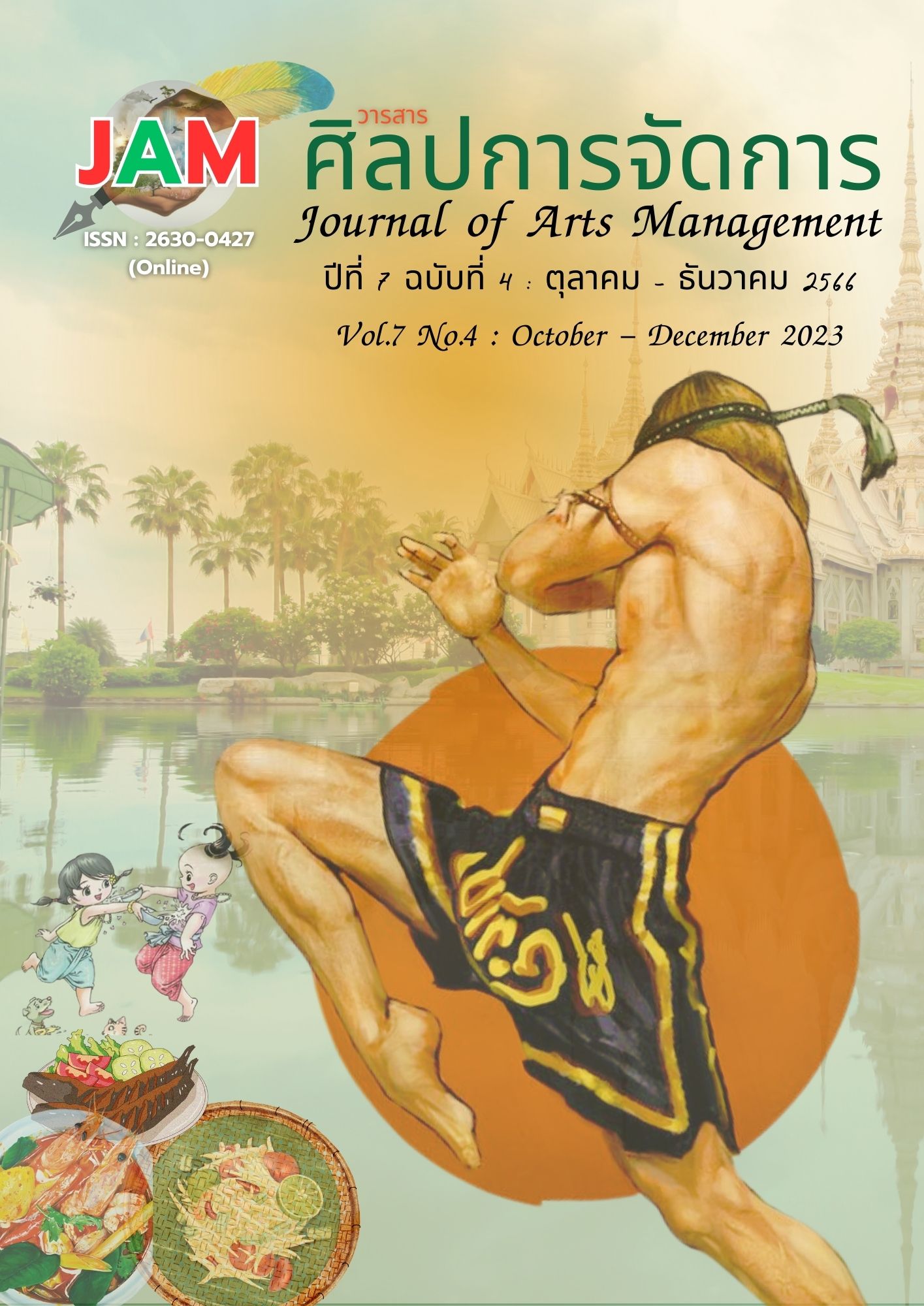ความต้องการจำเป็นในการพัฒนาความเป็นพลเมืองดิจิทัลของครูโรงเรียนมัธยมศึกษา สังกัดกรุงเทพมหานคร
Main Article Content
บทคัดย่อ
การวิจัยนี้มีวัตถุประสงค์เพื่อศึกษาสภาพที่เป็นจริง สภาพที่คาดหวัง และความต้องการจำเป็นในการพัฒนาความเป็นพลเมืองดิจิทัลของครูโรงเรียนมัธยมศึกษาสังกัดกรุงเทพมหานคร โดยมีกลุ่มตัวอย่างที่ใช้ในการวิจัย ได้แก่ ผู้บริหารสถานศึกษา และครูของโรงเรียนที่เปิดการเรียนการสอนระดับชั้นมัธยมศึกษาศึกษาปีที่ 1–6 โรงเรียนสังกัดกรุงเทพมหานคร จำนวน 10 โรงเรียน มีจำนวนทั้งสิ้น 303 คน เครื่องมือที่ใช้ในการวิจัย คือแบบสอบถาม สถิติที่ใช้ในการวิเคราะห์ข้อมูล ได้แก่ ร้อยละ ค่าเฉลี่ย ส่วนเบี่ยงเบนมาตรฐาน และ Modified Priority Needs Index (PNImodified)
ผลการวิจัยพบว่า 1) สภาพที่เป็นจริงของความเป็นพลเมืองดิจิทัลของครูโรงเรียนมัธยมศึกษาสังกัดกรุงเทพมหานคร ภาพรวมอยู่ในระดับมาก ( = 3.90) โดยด้านที่มีค่าเฉลี่ยต่ำสุด คือ ด้านการเคารพต่อกฎหมายและสิทธิของตนเองและผู้อื่น (
= 3.71) 2) สภาพที่คาดหวังของความเป็นพลเมืองดิจิทัลของครูโรงเรียนมัธยมศึกษาสังกัดกรุงเทพมหานคร ภาพรวมอยู่ในระดับมากที่สุด (
= 4.71) โดยด้านที่มีค่าเฉลี่ยสูงสุด คือ ด้านการทำธุรกรรมพาณิชย์ทางดิจิทัล (
= 4.80) 3) ความต้องการจำเป็น (Modified Priority Needs Index: PNImodified) ของการพัฒนาความเป็นพลเมืองดิจิทัลของครูโรงเรียนมัธยมศึกษาสังกัดกรุงเทพมหานครอยู่ระหว่าง 0.14–0.29 ในภาพรวมมีความต้องการจำเป็นอยู่ในระดับปานกลาง (PNImodified = 0.21) โดยด้านการเคารพต่อกฎหมายและสิทธิของตนเองและผู้อื่น (PNImodified = 0.29) มีความต้องการจำเป็นอยู่ในระดับสูง
Article Details

อนุญาตภายใต้เงื่อนไข Creative Commons Attribution-NonCommercial-NoDerivatives 4.0 International License.
ทัศนะและความคิดเห็นที่ปรากฏในบทความในวารสารศิลปการจัดการ ถือเป็นความรับผิดชอบของผู้เขียนบทความนั้น และไม่ถือเป็นทัศนะและความรับผิดชอบของกองบรรณาธิการ ยินยอมว่าบทความเป็นลิขสิทธิ์ของวารสารศิลปการจัดการ
เอกสารอ้างอิง
Cronbach, L. J. (1970). Essentials of Psychological Test (5th ed.). Harper Collins.
Foundation for the Promotion of Children and Youth Media. (2020). Digital Intelligence (DQ Digital Intelligence). http://cclickthailand.com/wp-content/uploads/2020/04/dq.
Kaeokerd, M., Chaemchoy, S., & Siribanpitak, P. (2021). The Priority Needs of Academic Management of Secondary Schools Based on The Concept of Digital Citizenship. Humanities and Social Sciences Journal of Pibulsongkram Rajabhat University, 15(1), 66-78.
Komcharoen, P., & Polnigongit, W. (2018). Children and Digital Literacy. College of Social Communication Innovation, SWU, 6(2), 22-31. https://so06.tci-thaijo.org/index.php/jcosci/article/view/169372
Krejcie, R. V., & Morgan, D. W. (1970). Determining Sample Size for Research Activities. Educational and Psychological Measurement, 30(3), 607-610.
Lawshe, C.H. (1975). A Quantitative Approach to Content Validity. Personnel Psychology, 28(4), 563-575.
Ministry of Education. (2010). Basic Education Core Curriculum B.E. 2551 (A.D.2008). https://academic.obec.go.th/images/document/1525235513_d_1.pdf
Montripuk S. (2007). Administrators’ Roles in Personnel Development to Standards of Performance of Teachers Council B.E. 2548 in Schools Under Petchaburi Educational Service Area Office 1[Master’s thesis, Srinakharinwirot University].
Office of the Secretariat of the Education Council, Ministry of Education. (2017). National Education Plan 2017–2036. Prikwarn Graphic.
Office of the Secretariat of the Education Council, Ministry of Education. (2019). Study Report on Guidelines for Creating and Promoting Digital Literacy for Teachers. Prikwarn Graphic.
Office of Educational Strategy Education Bureau Bangkok. (2020). Basic Education Development Plan Bangkok, Issue 3 (2021 – 2026).
One Fine Day.
Pahay, S. (2011). Internal Supervision is the Heart of Learning Reform in Schools. Academic Journal, 5(8), 25-31.
Perathornich, C. (2020). Challenges of Education Management in the Disruptive Change Era of School Administrators. CMU Journal of Education, 4(2), 126-139. https://so01.tci-thaijo.org/index.php/cmujedu/article/view/240199
Phonprasert, W. (2019). Development of a Measure and Criteria for Digital Citizenship of Students in Higher Education Institutions[Doctoral Dissertation, Naresuan University].
Ratchapat, A. (2011). Development of Indicators of Teacher Leadership in Basic Educational Institutions[Doctoral Dissertation, Khon Kaen University].
Ribble, M., & Bailey, G. (2007). Digital Citizenship in Schools. ISTE.
Sararatana, P. (2012). Concepts, Theories, and Issues for Educational Administration (8th ed.). Thippayawisutthi.
Thongkaew, T. (2020). New Normal Based Design in Education: Impact of COVID-19. Journal of Teacher Professional Development, 1(2), 1-10. https://ph02.tci-thaijo.org/index.php/withayajarnjournal/article/view/241830
Waikham, N. (2020). Strengthening Digital Citizenship Among Teachers at Affiliated Schools Administrative Organization as for Khonkaen Province Using Co-Development Supervision. Kroobannok. https://www.kroobannok.com/board_view.php?b_id=176353
Wannapiroon, P. (2014). Development of Research-Based Blended Learning Model to Develop Research Competency and Critical Thinking Skills of Graduate Students. Procedia–Social and Behavioral Sciences, 136(9), 486-490. https://doi.org/10.1016/j.sbspro.2014.05.361
Wilamas, W. (2020). The Needs of the Digital Citizenship for Teachers and Educational Personnel in Saraburi Province[Master’s thesis, Rajamangala University of Technology Thanyaburi].
Wongwanich, S. (2007). Needs Assessment Research (2nd ed). Chulalongkorn University.


